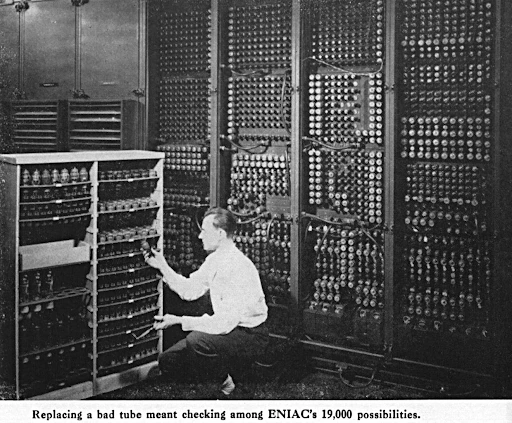Artificial Intelligence (AI) is developing and advancing right before our very eyes. It has aggressively integrated into our society as it contributes heavily to a plethora of fields such as medical, legal, military, and government. Although AI is used universally as a resource and tool, it is less certain how advanced and dependable it will become. Likewise, society is still determining the implications it will have on the global dynamic.
Diplomatic figures and institutes have utilized AI to enhance productivity and facilitate international development and diplomatic efforts. Diplomats who have served in various regions of the world have shared with ADST their views of AI in the workplace, the global sphere, and what the future could look like. This “Moment in U.S. Diplomatic History” will explore various diplomatic perspectives on AI over the time of its development and includes excerpts from the following ADST oral histories: Leslie Gerson (2007), a career consular officer, discusses how she wished she had more technological knowledge when she went to Sandia Labs since it would have aided in her understanding of AI; Keith Curtis (2018), who was acting senior commercial officer for a number of years, shares his viewpoint on how the future is not in AI but in aerospace; Richard Virden (2011), a National War College faculty member, discusses how AI contributes heavily to the military and the military-industrial-complex and questions if Congress is making the right decisions in allocating large amounts of money to combative efforts rather than countering cyberwarfare; and Jack Shellenberger (1990), the former director of programs at Voice of America, who remarks on the international development of AI in the context of political and trade relationships.
Drafted by Taylor Nydam
ADST relies on the generous support of our members and readers like you. Please support our efforts to continue capturing, preserving, and sharing the experiences of America’s diplomats.
Read Leslie Gersons full oral history HERE
Read Keith Curtis’s full oral history HERE
Read Richard Virden’s full oral history HERE
Read Jack Shellenberger’s full oral history HERE
Excerpts:
Leslie Gerson
Hispaniola, Antigua—Chief Consular Officer, 1985–1987
Geneva, Switzerland—Deputy Chief of Mission, 1994–1997
“. . . . with the bit of background that I gained in technology it would have made a lot more sense when we went to Sandia Labs . . . .”
Education and Technology:
Well, education was one. Certainly we looked a lot at high tech, which was very hard for those of us without a high tech background. Many of the folks were really into high tech, but for people like me it was eyes glazing over sometimes. I wish I could have done the year a second time, because with the bit of background that I gained in technology it would have made a lot more sense when we went to Sandia Labs and were talking about artificial intelligence. We looked a lot at grass roots activism in the rural South and we went into the Mississippi Delta area.

Keith Curtis
Washington, DC—Deputy Director, Europe Desk, 1995–1998
Baghdad, Iraq—Senior Commercial Officer, 2013–2014
“Well, I think there’s a lot of BS in the whole AI.”
Are there Bigger Fish than AI?:
You didn’t really ask about what the future’s going to be, but those are changes I would make. I would put them under one roof, and I would pull the plug on the cable system tomorrow. But in terms of where the world’s going to go? Who knows. Nobody could predict it if it comes down to the oil or the power market or the cellular market or the social media market. I’ve seen enough to be smart enough to not try to predict what’s the next big thing. Everybody says AI (artificial intelligence).
Well, I think there’s a lot of BS in the whole AI. What I like to think of, is that it’s more going to be about how you manage your individual lives. The Bill Gates and the Elon Musks of the world . . . . I do think space has a future. I think aerospace has a real future. I have two boys, and their whole . . . . Not only their professional lives, but their real interest and their real love . . . . You know, they watch all the sci-fi in the world, and these guys want to go back to the moon. They want to go to Mars. They want that in their future, and they work on it. They dream about it and they work on it, and if there were anything they wanted, it would be to reach out and get started. Let’s go. So, I do think there’s going to be . . . . And that’ll be interesting, to see how that develops. Everybody’s getting into the space race. But it could be a good thing.
Richard Virden
Warsaw, Poland—Information Officer and Press Attaché, 1977–1980
Washington, DC—The National War College at Ft. McNair, 1983–1984
“The cyberwarfare and Artificial Intelligence (AI) experts in our Armed Forces are waging an uphill battle . . . .”
Congressional Conundrum:

When I was on the faculty of the National War College in the early 2000s, our military experts were beginning to think about how to use social media tools to our benefit and defend against those who would harm us. That task has become even more imperative since the 2016 election.
The fight, as it so often is, will be about getting resources needed for the job.
The cyberwarfare and Artificial Intelligence (AI) experts in our Armed Forces are waging an uphill battle for a decent slice of the defense budget.
They’re competing with big ticket hardware like tanks, and planes and ships, which create jobs and so have strong Congressional advocates. The military-industrial-Congressional complex can’t just expect more of everything. A choice must be made for the wars of today and tomorrow, not the past. Should we keep building more multi-billion-dollar aircraft carriers—we already have more of them than the rest of the world combined—or direct more resources to more modern threats, like cyberwarfare?
Jack Shellenberger
Washington, DC—Voice Of America Policy Officer, 1973
Tokyo, Japan—Public Affairs Officer, 1984
“Among the events of the late ’80s in Japan was the Tsukuba Expo, which was, for the U.S. Pavilion, explaining artificial intelligence.”
AI in Global Events of the 1980s:
The ’80s—this is before ’88—was also a time of continuing competition and rivalry with the Soviet Union in security matters, and Japan’s steadfast performance on the security front and its readiness to share more and more of the burden, the cost of maintaining our forces there I think muted some of the more eager members of the Administration who would mix the political security relationship with that of the trade relationship. Since ’88 that’s changed and I think under the Bush Administration there is disposition to take aim at trading practices that might have not been aimed at with the same force as during the last part of the Reagan Administration. Among the events of the late ’80s in Japan was the Tsukuba Expo which was, for the U.S. Pavilion explaining artificial intelligence. Complex subject, to say the least. But our involvement was marginal, it was actually managed by an exhibits team of professionals.”

